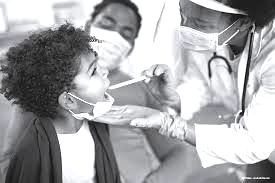CULLMAN, Ala. – Sniffles, sneezing and getting sick are never anyone’s idea of a grand time. Unfortunately, entering public spaces and catching viruses, bacteria and germs is something that is just unavoidable. When suspecting an illness in the home, especially with small children, it is easy to go into panic mode at the first cough. The immune system in infants and children is much more fragile and underdeveloped than that of an adult, and as such, infants and children are highly susceptible to bacteria and viruses. Proper handwashing and hygiene can prevent 30% of gastroenteric sickness and 20% of respiratory illnesses.
Dr. Nathaniel Burnham of Cullman Primary Care said, “Proper handwashing technique is essential to help prevent the spread of illnesses. Ensuring that you get vaccinated at the appropriate times is also incredibly important.”
While some illnesses that are typically contracted in the winter months are easily resolved with over-the-counter treatments and rest, there are some that are far more serious and may require more vigorous intervention and treatment, or in some cases, hospitalization.
Burnham remarked, “Most of these illnesses are treated by conservative management ensuring that we treat the symptoms of these illnesses with the appropriate over-the-counter medications, and these illnesses will resolve on their own within a few days most of the time.”
So, which illnesses should be taken more seriously? There is a fine line between safe to stay home, and when it is time to call and be seen by a health care provider.
In infants and children, Respiratory Syncytial Virus (RSV), influenza and streptococcal pharyngitis (commonly known as strep throat) are the most commonly diagnosed illnesses during the cooler months. Many of these symptoms overlap and most mimic the common cold, and severity is influenced by many factors.
RSV is a virus that infects and inflames the lungs and respiratory tract. Symptoms of RSV closely mimic those of the common cold and the virus is contracted just as easily. RSV is spread when a person comes into contact with fluid from an infected person’s nose or mouth; this can also happen when touching a contaminated surface and then touching eyes, mouth or nose. It can also spread by inhaling droplets from an infected person’s sneeze or cough.
Symptoms of RSV include:
- Runny Nose
- Fever
- Cough
- Wheezing
- Breathing faster or slower than normal
- Trouble eating or drinking
- Flaring nostrils while breathing
- Straining of the chest or stomach while breathing
- Blue skin around lips or fingertips
Treatment of RSV is dependent on age, severity of symptoms and overall health of the patient. Since RSV is viral, and not bacterial, it is not treated with antibiotics, but with comfort assistance measures such as additional oxygen and oral/intravenous fluid, suctioning of mucus and breathing treatments used to open airways; in more pressing cases, mechanical ventilation, tube feedings and antiviral medications are used to ease symptoms. To prevent the illness, a medication called Nirsevimab can be given as a shot to at-risk infants during RSV season and as a once-yearly injection for adults 60 and older.
Influenza, more commonly known as the flu, is a virus that also widely affects infants and children severely. The flu is an infection of the nose, throat and lungs; a large portion of the respiratory system is affected. Common symptoms of the flu often, but not always, include fever as well as aching muscles, chills and sweats.
Symptoms of Influenza include:
- Headache
- Dry persistent cough
- Shortness of breath
- Tiredness and lethargy
- Runny nose
- Sore throat
- Eye pain
- Vomiting and diarrhea
The only available treatment for influenza is prescription antiviral medication; if taken within two days of onset of symptoms, it has been shown to shorten the length of illness and make symptoms milder and more manageable. The influenza vaccine came onto the market in 1945 and is still recommended for everyone 6 months and older.
Strep throat is a bacterial infection of the throat and tonsils, caused by group A Streptococcus, and causes severe inflammation and sore throat. Strep throat is the most commonly reported illness involving a sore throat. Visible symptoms can include enlarged tonsils and white infection pockets on the throat; red spots, or petechiae, on the roof of the mouth are also a common symptom. Strep throat is highly contagious and spreads between individuals very quickly through respiratory droplets from an infected person.
Symptoms of strep throat include:
- Sore throat
- Fever
- Streaks or patches of pus on the throat
- Headache
- Chills
- Nausea and vomiting
Strep throat is a bacterial infection and therefore, treatment may include a seven- or 10-day course of antibiotic therapy. Penicillin and amoxicillin are the most commonly prescribed antibiotics; if there is a history of a penicillin allergy, a provider may prescribe azithromycin or cephalexin instead.
Adults are commonly diagnosed with all the above, along with two additional illnesses that are regularly diagnosed in teens and adults. As well as influenza, RSV and strep throat, many adults are also diagnosed with pneumonia and acute bronchitis.
Pneumonia is an infection that inflames the air sacs in the lungs, leading to chest pain, difficulty breathing and coughing. Multiple types of bacteria, fungi and viruses can cause pneumonia. Symptoms of this illness are similar to those of influenza or the common cold but have longer duration and heightened severity in some instances.
Symptoms of pneumonia:
- Cough that may produce phlegm
- Rapid breathing/shortness of breath
- Chest pain that worsens with a deep breath
- Fatigue
- Confusion in people over 65
The treatment for pneumonia depends largely on the type of pneumonia that has been diagnosed. Bacterial pneumonia is treated with antibiotics and fungal pneumonia with anti-fungal medication. Viral pneumonia does not typically require treatment, but if influenza was the cause of pneumonia, it can be treated with antiviral medications. There are multiple vaccines on the market currently to protect against pneumonia and are recommended differently depending on age group, risk factors and health history.
Acute bronchitis is colloquially referred to as a chest cold. In actuality, bronchitis happens when the trachea and bronchi become inflamed and filled with mucus, most commonly caused by a virus. The most notable symptom is the nagging cough that can be present for up to two weeks as the body tries to rid mucus from its airways.
Symptoms of acute bronchitis:
- Persistent cough
- Wheezing
- Fever
- Fatigue
Acute bronchitis typically does not require treatment, and over-the-counter cough suppressants are often recommended by doctors.
COVID-19
According to the United States Centers for Disease Control and Prevention (CDC), “COVID-19 (coronavirus disease 2019) is a disease caused by a virus named SARS-CoV-2. It can be very contagious and spreads quickly. Over one million people have died from COVID-19 in the United States.
“COVID-19 most often causes respiratory symptoms that can feel much like a cold, the flu or pneumonia. COVID-19 may attack more than your lungs and respiratory system. Other parts of your body may also be affected by the disease. Most people with COVID-19 have mild symptoms, but some people become severely ill.”
Symptoms of COVID-19:
- Fever or chills
- Cough
- Shortness of breath or difficulty breathing
- Fatigue
- Muscle or body aches
- Headache
- New loss of taste or smell
- Sore throat
- Congestion or runny nose
- Nausea or vomiting
- Diarrhea
Per the CDC, “If you have COVID-19 and are more likely to get very sick from COVID-19, treatments are available that can reduce your chances of being hospitalized or dying from the disease. Medications to treat COVID-19 must be prescribed by a healthcare provider or pharmacist and started 5–7 days after symptoms appear. Contact a healthcare provider right away to determine if you are eligible for treatment, even if your symptoms are currently mild.”
COVID-19 vaccines are also available.
The severity of these illnesses varies greatly from person to person, with no two exactly the same. Some may be asymptomatic or some may have severe symptoms. Contact a doctor for any information regarding vaccines and preventative measures, or with any questions about these illnesses.
Copyright Humble Roots LLC, 2023. All Rights Reserved.






























